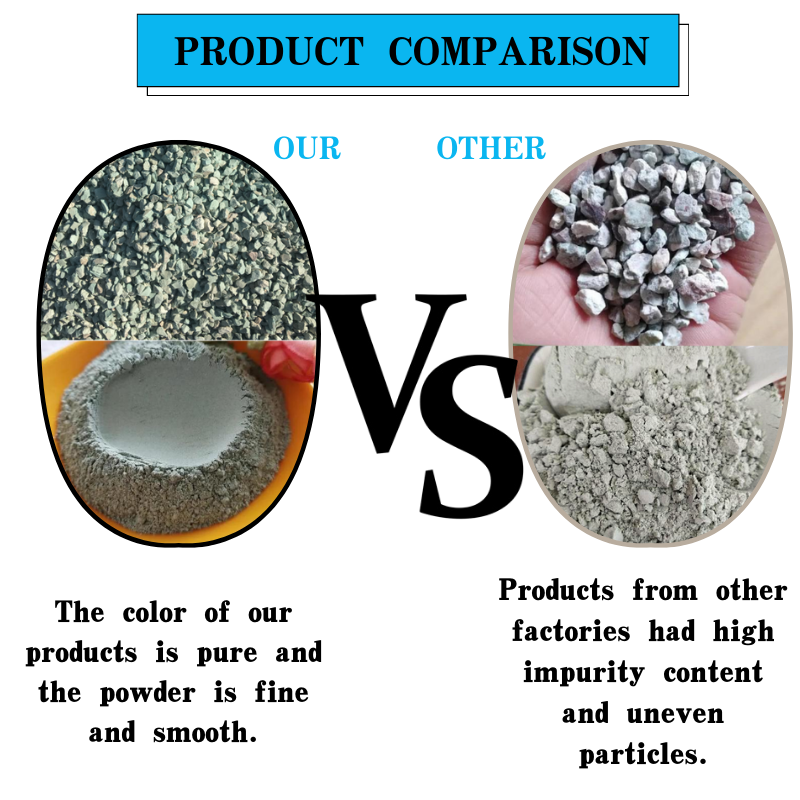
silicon carbide abrasive
Silicon Carbide Abrasive A Comprehensive Overview
Silicon carbide (SiC) is a remarkable compound that has found extensive application in various industries due to its unique properties, particularly in the realm of abrasives. Its hard and durable nature makes it an ideal material for cutting, grinding, and polishing a variety of surfaces. In this article, we will explore the composition, production, applications, advantages, and future prospects of silicon carbide abrasives.
Composition and Properties
Silicon carbide is a compound made up of silicon and carbon. It occurs naturally in a form called moissanite, but most silicon carbide used in industrial applications is synthetically produced. The hardness of silicon carbide on the Mohs scale is around 9.5, which makes it one of the hardest materials available, second only to diamond. This hardness, combined with its thermal stability, low thermal expansion, and excellent chemical resistance, makes silicon carbide an ideal abrasive material.
Production of Silicon Carbide Abrasives
The production of silicon carbide abrasives involves high-temperature processes that typically take place in electric arc furnaces. The primary raw materials required for production include silica sand and petroleum coke. The mixture is subjected to temperatures exceeding 2000 degrees Celsius, which results in the reaction between silicon and carbon to form silicon carbide. The resulting material can then be crushed and graded into various sizes and shapes suitable for different abrasive applications.
There are two main types of silicon carbide abrasives black silicon carbide and green silicon carbide. Black silicon carbide is the more commonly used variant and is made using a specific ratio of raw materials, resulting in a more robust product suited for general-purpose use. Green silicon carbide, on the other hand, is purer and has sharper edges, making it perfect for applications that require precision, such as the machining of hard materials.
Applications of Silicon Carbide Abrasives
Silicon carbide abrasives are used in a wide range of applications across various industries. Some of the most common uses include
1. Metalworking Silicon carbide abrasives are widely employed in cutting, grinding, and polishing metals due to their superior hardness and durability. They are particularly effective in machining hard metals and are commonly used in the production of tools and components.
silicon carbide abrasive

2. Automotive Industry In the automotive sector, silicon carbide abrasives are used for surface finishing, sanding, and grinding of various engine components. They are also utilized in the production of brake linings and clutches, where heat resistance is crucial.
3. Aerospace Industry Due to the demand for lightweight and high-strength materials, silicon carbide abrasives are utilized in the aerospace industry for machining composite materials, titanium alloys, and other advanced materials.
4. Construction and Abrasive Blasting Silicon carbide is commonly used for abrasive blasting, surface preparation, and finishing in the construction industry. Its durability and effectiveness make it ideal for removing rust, paint, and other contaminants from surfaces.
5. Electronics Silicon carbide’s electrical properties are exploited in the manufacturing of semiconductors and other electronic devices, where it is crucial to have stable and efficient materials.
Advantages of Silicon Carbide Abrasives
The advantages of using silicon carbide abrasives are manifold. First and foremost, their exceptional hardness allows for faster and more efficient cutting compared to other abrasive materials. This results in reduced processing times and lower manufacturing costs. Additionally, silicon carbide’s thermal stability means that it can withstand higher operating temperatures without degrading, leading to longer tool life.
Moreover, silicon carbide abrasives generate less heat during operations, minimizing the risk of thermal damage to the workpiece. Their chemical resistance also ensures that they can be used effectively in a variety of environments, including those that may be corrosive.
Future Prospects
As industries continue to evolve and the demand for advanced materials increases, the prospects for silicon carbide abrasives look promising. Ongoing research and development efforts are focused on enhancing their properties and finding new applications, particularly in the fields of renewable energy and electronics.
In conclusion, silicon carbide abrasives play a vital role in modern manufacturing and industrial processes. With their unbeatable hardness, thermal stability, and versatility, they are set to remain a key material in various applications for years to come. As technology advances, silicon carbide abrasives will continue to pave the way for innovations across multiple industries, solidifying their position as an indispensable tool in the modern manufacturing landscape.
Share
-
Premium Natural Zeolite Sand – Custom Manufacturers & Factories High Purity & Versatile UseNewsJul.04,2025
-
Premium Microsilica Silica Fume Powder Custom Manufacturers & Factories SolutionsNewsJul.04,2025
-
Premium Clay Pebbles for Drainage – China Manufacturer & OEM Factory SolutionsNewsJul.04,2025
-
Vermiculite Wholesale – Premium Quality, Bulk Supply & Competitive PricingNewsJun.10,2025
-
Premium Glass Pebbles Custom Glass Pebbles Factory & OEM Manufacturer Reliable Custom Glass Pebbles FactoriesNewsJun.10,2025
-
Expert Custom Zeolite Producers Manufacturers & FactoriesNewsJun.10,2025






